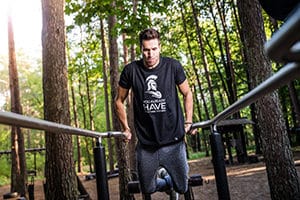What is Anxiety?
In order to cope with anxiety, it’s important to understand what it is. Anxiety is a normal emotion. When we experience stress or fear, the body naturally responds by releasing cortisol and adrenaline, which trigger anxiety symptoms. This is a biological reaction called the fight or flight response. Worrying and occasional anxiety are common aspects of life. However, when anxiety does not go away and gets worse with time, it is a different story and could indicate an anxiety disorder.
Anxiety disorders often involve sudden episodes of intense fear or terror that go from 0 to 100 very quickly. Experiencing these episodes, commonly called “panic attacks,” often can be a sign of an anxiety disorder. Individuals with anxiety disorders also often experience persistent and excessive worry or fear regarding regular everyday events and situations. If you or a loved one are showing signs of anxiety disorder, contact a medical professional.
For people recovering from addiction, anxiety is a common occurrence. Unmanaged anxiety is a leading cause of relapse. Learning to proactively acknowledge and cope with anxiety is essential for maintaining long-term recovery.
Here are some tips for coping with anxiety.
1. Identify Anxiety Triggers

Stress About Recovery
Including anxiety about succeeding, worries about relationship troubles, and other consequences of drug or alcohol use.
Sleeplessness
Research shows that sleep problems are very common in the early stages of recovery from alcohol addiction and that sleep disorders can linger for several months.
Fear of Social Environments
Addiction often causes isolation, which makes the interactions of rehabilitation challenging for people who are already anxious.
Brain Fog
Fuzzy thinking interferes with concentration and focus, which makes it difficult to make decisions and solve problems related to addiction and recovery.
2. Aftercare Treatment Programs
While anxiety disorders are treatable, symptoms may continue well after completing your primary treatment program. Participating in an aftercare program bridges the gap between primary addiction treatment and fully independent living. These programs have proven to be highly successful in establishing long-term sobriety and can be instrumental in developing solid skills to cope with anxiety. Aftercare treatments may include:
- Relapse Prevention Therapy
- Individual and Group Therapy
- Medication-Assisted Treatment
- 12-Step Meetings and Other Support Groups
Relapse prevention therapy is utilized to help you stay clean and sober and improve your recovery experience. Individual and group therapy sessions offer treatment with a trained therapist in a safe, controlled environment. Medication-assisted treatment (MAT) combines medically prescribed addiction treatment medications with counseling and behavioral therapies. Support groups and 12-Step meetings are safe environments where peers can share advice, experiences, and feelings.
3. Physically Activity and Exercise

For best results, exercise with the assistance of a personal trainer. Exercising too long or with too much intensity during recovery can cause muscle strain and other painful conditions that can increase stress. Performing the correct exercises, using the right form, and exercising for the right length of time can calm anxiety without increasing stress.
4. Watch What You Eat

- Complex carbohydrates, like those found in whole-grain foods, metabolize more slowly to keep blood sugar levels constant.
- Salmon contains vitamin D and omega-3 fatty acids, which may help regulate the neurotransmitters dopamine and serotonin to impart a calming effect.
- Chamomile, turmeric, and other foods can alleviate anxiety.
Drug Abuse and Nutritional Deficiencies
Good nutrition during the recovery process can help undo some of the anxiety-inducing physical problems resulting from substance abuse.
- Alcohol use is one of the major causes of nutritional deficiencies among Americans, for example, according to the National Institutes of Health (NIH). Specifically, drinking alcohol can lead to vitamin B deficiencies, which can result in anemia and nervous system problems.
- Using opioids and opiates can cause constipation. The use of stimulants can reduce appetite, resulting in poor nutrition and weight loss.
- Addiction to drugs or alcohol often causes other nutritional challenges, such as failure to eat and eating poorly. To recover from a major physical event, such as substance abuse, the organs of the body require a great deal of energy, vitamins, and minerals. The nutritional deficits caused by alcohol or drug use puts the body at a disadvantage going into recovery, so an individual must focus on consuming highly nutritious foods through recovery to help his or her body heal from years of abuse.
- Anxiety, coupled with the recovery process, can cause nutrition problems too. Anxiety can cause loss of appetite, nausea, and vomiting, for example. Opioid withdrawal can cause extended bouts of diarrhea and vomiting, which can lead to a lack of nutrients and imbalances of electrolytes, such as sodium, chloride, and potassium.
5. Seek Care for Co-Occurring Disorders

Because anxiety and excessive alcohol or drug use are so closely intertwined, treatment for dual diagnoses may support recovery better than treating just the anxiety or just the substance abuse.
Key Points to Help Cope with Anxiety in Recovery
To cope with anxiety in recovery, it is important to remember:
- There is a strong connection between anxiety and alcohol or drug abuse
- There is a strong association between anxiety and recovery
- Fortunately, there are many ways to soothe anxiety during recovery
- Identifying the source of anxiety is an important first step
- Alcohol and drug abuse can cause physical problems resulting in anxiety; proper nutrition can help
- Treatment for anxiety is often overlooked but beneficial to recovery
- Moderate exercise raises natural “feel good” chemicals
- Seeking treatment that offers care for the co-occurring disorder may provide a better recovery experience than could treatment for either substance abuse or anxiety alone.
If you or someone you know has anxiety and a drug or alcohol problem, contact our admissions specialists at Granite Recovery Centers. The sooner treatment starts, the sooner recovery can begin.






